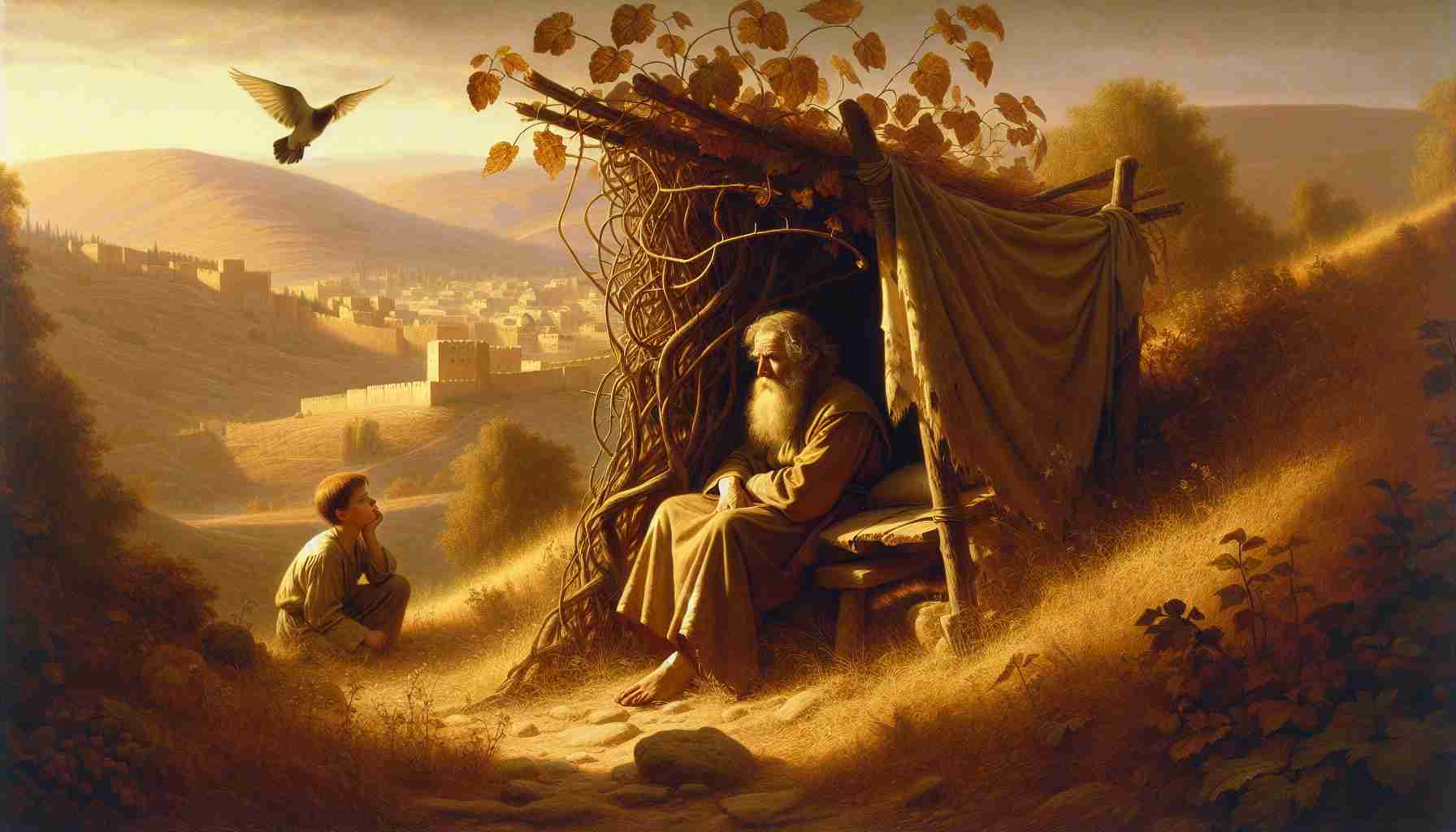

My name won’t echo through any scroll, but I was once Jonah’s servant—charged with carrying messages and provisions. I had followed him from Israel to the edge of the great city of Nineveh. But I never expected I would witness a prophet shout at God.
We had made camp east of the city. The dust of Nineveh still clung to my sandals. I remember Jonah’s face—darkened not with soot but with anger. He sat beneath a makeshift shelter of sticks, eyes fixed on the city he had prophesied against.
"It's not right," he muttered. “I knew You'd forgive them.”
I stayed silent, unsure whether I was allowed to speak.
Jonah had walked the streets of Nineveh—the capital of Assyria, a powerful kingdom that had long threatened our people. He cried out: “Forty days more and Nineveh shall be overturned!” And then, something unheard of happened. They listened. From the king in his palace to the oxen in the field, all mourned and fasted. They turned from their violence. And God, in His mercy, didn’t destroy them.
But Jonah… he looked betrayed.
That evening, a vine grew behind him. I watched in awe as its leaves spread quickly, giving shade to his sunburned neck. Jonah relaxed for the first time in days, his shoulders dropping, his eyes softening.
“Finally, something good,” he mumbled.
But at sunrise, before we had even chewed our morning bread, the vine wilted. A worm—small, quiet—had eaten its roots. Then a hot wind tore through the east. Jonah gripped his cloak as gusts beat against us, waves of heat stinging our skin. He crouched in despair.
I had never seen a prophet break. But now I heard him say, “It is better for me to die than to live.”
And then God’s voice came. Not in thunder, but deep within Jonah’s own heart.
“Are you so deeply grieved about the plant?” He asked.
“Yes,” Jonah growled. “So deeply that I want to die.”
God’s voice was calm, and it wrapped around us like a breeze cooler than the desert wind.
“You cared about the plant, which you did not work for, and which grew in a night and perished in a night. Should I not care about Nineveh, that great city, with more than 120,000 souls who cannot tell their right hand from their left—plus many animals?”
I saw Jonah go silent. His hands unclenched.
In that moment, I understood what he did. We—Israel—had enemies. Nineveh had been cruel. But God's mercy… it was not only for us. I believe Jonah had always known this, but it was not until that plant died—until he felt the loss of something he did not build—that he finally understood it clearly.
I asked him nothing as we packed. He nodded toward me, his face unreadable, but softer than before.
We walked back toward home, leaving Nineveh behind. Mercy, I think, walked beside us.
My name won’t echo through any scroll, but I was once Jonah’s servant—charged with carrying messages and provisions. I had followed him from Israel to the edge of the great city of Nineveh. But I never expected I would witness a prophet shout at God.
We had made camp east of the city. The dust of Nineveh still clung to my sandals. I remember Jonah’s face—darkened not with soot but with anger. He sat beneath a makeshift shelter of sticks, eyes fixed on the city he had prophesied against.
"It's not right," he muttered. “I knew You'd forgive them.”
I stayed silent, unsure whether I was allowed to speak.
Jonah had walked the streets of Nineveh—the capital of Assyria, a powerful kingdom that had long threatened our people. He cried out: “Forty days more and Nineveh shall be overturned!” And then, something unheard of happened. They listened. From the king in his palace to the oxen in the field, all mourned and fasted. They turned from their violence. And God, in His mercy, didn’t destroy them.
But Jonah… he looked betrayed.
That evening, a vine grew behind him. I watched in awe as its leaves spread quickly, giving shade to his sunburned neck. Jonah relaxed for the first time in days, his shoulders dropping, his eyes softening.
“Finally, something good,” he mumbled.
But at sunrise, before we had even chewed our morning bread, the vine wilted. A worm—small, quiet—had eaten its roots. Then a hot wind tore through the east. Jonah gripped his cloak as gusts beat against us, waves of heat stinging our skin. He crouched in despair.
I had never seen a prophet break. But now I heard him say, “It is better for me to die than to live.”
And then God’s voice came. Not in thunder, but deep within Jonah’s own heart.
“Are you so deeply grieved about the plant?” He asked.
“Yes,” Jonah growled. “So deeply that I want to die.”
God’s voice was calm, and it wrapped around us like a breeze cooler than the desert wind.
“You cared about the plant, which you did not work for, and which grew in a night and perished in a night. Should I not care about Nineveh, that great city, with more than 120,000 souls who cannot tell their right hand from their left—plus many animals?”
I saw Jonah go silent. His hands unclenched.
In that moment, I understood what he did. We—Israel—had enemies. Nineveh had been cruel. But God's mercy… it was not only for us. I believe Jonah had always known this, but it was not until that plant died—until he felt the loss of something he did not build—that he finally understood it clearly.
I asked him nothing as we packed. He nodded toward me, his face unreadable, but softer than before.
We walked back toward home, leaving Nineveh behind. Mercy, I think, walked beside us.